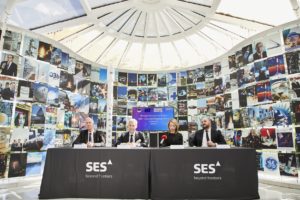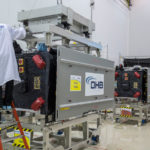SES will provide a series of services for the Galileo European navigation system under a long-term agreement signed with Spaceopal, SES announced today.

Left to right: Ruy Pinto (SES CIO), André Bauerhin (Spaceopal COO), Nicole Robinson (SES Networks SVP Global Government) and Etienne Schneider (Luxembourg Deputy Prime Minister, Minister of the Economy)
The contract is part of the Galileo Service Operator (GSOp) framework agreement between Spaceopal – a joint venture between Telespazio and DLR GfR mbH – and the European Global Navigation Satellite System Agency (GSA). Read more…



